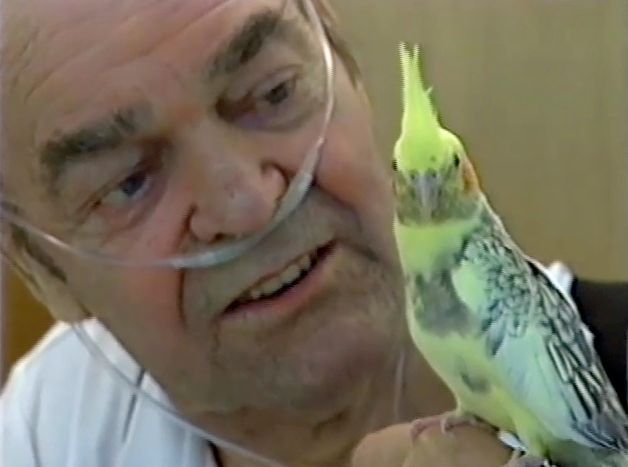I'm at that stage in my journey where I'm shopping for a nursing home for my dad. Thinking about what life is like there reminded me of the time I learned how to find a story where none existed.
I was directing a doc series for Discovery about the healing power of animals, getting ready to shoot an episode about nursing homes, featuring Archie, a retired logger. He was pretty young for a nursing home, kept there by a need for daily medical attention. Before getting sick, he and his wife had kept parakeets as pets, hand-training them so they could pet and play with them.
Archie thought he'd go crazy in the nursing home with all the "old" people, until he discovered the birds they kept in the atrium, especially Baby. She was also hand trained and became Archie's BFF. Until she died shortly before we started filming.
That was my dilemma. I had all this powerful back story about the health benefits Archie got from caring for Baby - but nothing I could actually film. Heartbroken, Archie just got up every day, said hello to the rest of the birds in the cage, then sat around being sad. In story lingo, I had a problem (Archie being sad), but no quest or solution. Nobody was doing anything to solve the problem of Archie's loss. Which meant that I didn't have a story to tell.
So, I decided to make one. I gave the nursing home money to buy a new, hand-trained bird. Then we filmed them introducing Baby 2.0 to Archie. Well, it was quite the scene. Tears of joy all around. TV gold.
Though I solved my dilemma, in hindsight, I'm not happy with the way I handled things. I broke my unwritten rule of not "manipulating" the situation to keep the story "true".
That said, I know now that all communication manipulates things in some way, even just a list of facts or data. Simply choosing what to include or exclude, what order we present things in and how we contextualize something influences the way our message is received. Understanding that gives us the power to be aware of our biases and (often subconscious) intentions when we tell a story, so we can make sure we design it according to our values of honesty, integrity, authenticity and respect.
What could I have done differently? Re-framed. Dug deeper to find another angle. Because experience tells me there's always another angle.
I could have started the story with Baby's death and explored how Archie's loss brought him closer to others at the home. Looked at how the bird lovers in the residence came together to help the remaining birds cope with the loss of their companion. Or waited to discover that the loss gave Archie a new sense of purpose, to find ways to bring more birds in for others to enjoy.
Stories are power. We have to remember that along with the great joy we get from telling them comes great responsibility to use them wisely. I'm grateful to all the Archies in my life for continuing to teach me this lesson. And I hope that, wherever my Dad ends up, he'll be able to find purpose and community the way Archie did.





